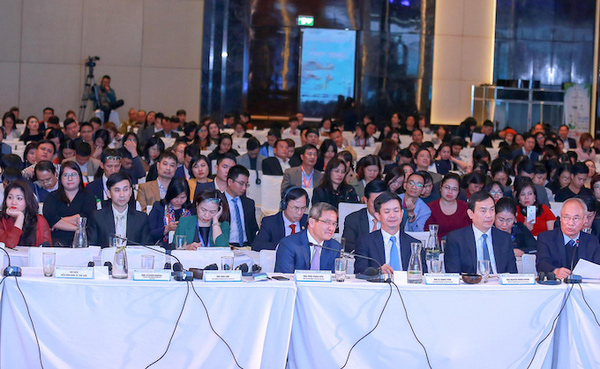
The second Vietnam Travel & Tourism Summit attracted the participation of many experts and managers. (Photo: hanoimoi.com.vn)
Deputy Minister of Culture, Sports and Tourism Le Quang Tung said that the Vietnam tourism industry has made great progress in recent years. Its competitive capacity continues to improve on the ranking of the World Economic Forum, from 75th out of 141 countries in 2015 to 67th out of 136 countries in 2017 and 63rd out of 140 countries in 2019.
Index component groups seeing the highest increase are international opening level (15 steps), price competitiveness (13 steps) and aviation infrastructure (11 steps), compared to 2017.
In 2019, the country was ranked 6th out of 10 countries with world’s fastest tourist growth; voted as the World’s Leading Heritage Destination, Asia’s Leading Travel Destination, Asia’s Leading Cultural Destination, Asia’s Leading Culinary Destination and many other prestigious awards.
From the start of the year to the end of November, Vietnam greeted nearly 16.3 million foreign tourists, a year-on-year rise of 15.4%. It is expected to welcome about 18 million foreigners; earning a revenue of VND720 trillion. The figures will meet the targets set by the Government from the start of the year.
However, Vietnam tourism still faces many challenges for sustainable development, and there is still a lot of work to focus on so that its competitive capacity will be listed among the world’s top 50 by 2021 and the country will earn total revenue of USD45 billion by 2025.
Experts said that aiming to achieve the targets; Vietnam should focus on revitalising national tourism promotion to inspire more foreigners to visit the country, and improving the nation’s tourism messages and the operation of tourism offices abroad.
They emphasized the need for the early launch of a tourism development support fund, while other discussions dealt with how to address problems such as overcharging tourists, food safety and safety for visitors.
Participants also discussed how to improve tourists’ experience in preparing and planning Vietnam visits, considering the fact that many visitors face difficulties in using Vietnamese online tourism services, such as real products not matching advertisements and a lack of direct consultancy.
In addition, increasing tourism products, improving infrastructure, ensuring a safe environment, enhancing human resources quality and applying information technology, are also key issues discussed at the summit./.